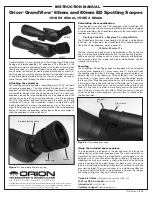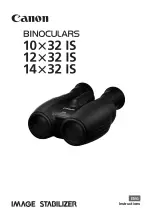
INSTRUCTION MANUAL
IN 611 Rev. A 01/18
Orion
®
GrandView
™
65mm and 80mm ED Spotting Scopes
#51852 65mm, #51853 80mm
Congratulations on your purchase of the GrandView ED Spotting
Scope with interchangeable 1.25" eyepieces. The ED glass in the
objective lens means you’ll enjoy images with far less color distortion
than those seen in a standard scope. Your spotting scope is a high-
quality optical instrument for viewing birds, wildlife, sports events, or
anything else you want to see more closely. It will provide many years
of enjoyable viewing. Before using your spotting scope, we recom-
mend that you read through the following instructions.
Attaching the eyepieces
Your spotting scope is capable of accepting most all 1.25" standard
astronomical eyepieces. The GrandView ED includes a 1.25" zoom
eyepiece that should fit most needs, but optional non zoom eyepieces
are available through Orion should you desire them. To attach your
eyepieces, loosen the large knurled collar on the eyepiece end of the
spotting scope by rotating it counter-clockwise. Insert the eyepiece
until it is fully seated, and then tighten down the collar by rotating
clockwise until snug. The GrandView utilizes a compression style
locking mechanism to clamp the eyepiece by way of this collar, in
order to hold it securely and also not scratch the side of the eyepiece
barrel. To remove the eyepiece, simply loosen the collar enough to
allow the eyepiece to slide out by hand.
Calculating the magnification
If you decide to use your own 1.25" eyepiece in the GrandView ED,
you can determine the power using the following formula by plugging
in the focal length of the GrandView along with the focal length of the
eyepiece you want to use:
Spotting Scope F.L. ÷ Eyepiece F.L. = Magnification
The GrandView 65mm has a focal length of 345.8mm, and the 80mm
is 432mm. So for example, the GrandView 80mm, used in combina-
tion with a 25mm eyepiece, yields a power of:
432mm ÷ 25mm = 17x
We don’t recommend going over a magnification of 60x during the
day, as atmospheric disturbances due to the sun heating the atmo-
sphere above hot surfaces such as roads, sidewalks and buildings,
can severely distort the image, and higher magnification will just
magnify this distortion.
Focusing
The GrandView ED spotting scopes are equipped with a dual speed
focusing knob, capable of 1:1 gross focus, and 9:1 fine focus. Point
the spotting scope so that it is aiming in the general direction of an
object at least 12' away (65mm) or 18' away (80mm). Turn the larger
focus knob (1:1 gross focus) with your fingers until the object comes
into focus. Go a little bit beyond sharp focus until the image just starts
to blur again, then reverse the rotation of the knob, just to make sure
you’ve hit the exact focus point. You can switch to the smaller focus
knob (9:1 fine focus) in order to more finely control the focus shift
and hit the exact focus of your subject. When you zoom in and out
using the included zoom eyepiece, you may have to slightly adjust
the focus position.
Using the included zoom eyepiece
The magnification is adjusted to the desired level by rotating the
middle section of the zoom eyepiece body. The arrow indicator and
magnification scale shows the magnification setting based on the
objective size of your GrandView (65mm or 80mm). Changing the
magnification may also require a slight refocusing of the spotting
scope to achieve the sharpest image. For general use, it’s a good
idea to start viewing at the lowest magnification until you’ve acquired
your viewing target. Then you can zoom in to a higher magnification
to see more detail. Note that as magnification increases, the images
will not be as bright as they are at lower powers.
Figure 2.
Dual speed focus knob
Fine focus
(9:1)
Gross focus
(1:1)
Figure 1.
The eyepiece and locking ring
Eyepiece locking collar
Zoom ring
Eyecup
#51853
#51852
Corporate Offices:
89 Hangar Way, Watsonville CA 95076 - USA
Toll Free USA & Canada:
(800) 447-1001
International:
+1(831) 763-7000
Customer Support:
support@telescope.com
Copyright © 2020 Orion Telescopes & Binoculars. All Rights Reserved. No part of this product
instruction or any of its contents may be reproduced, copied, modified or adapted, without the
prior written consent of Orion Telescopes & Binoculars.
A N E M P L O Y E E - O W N E D C O M P A N Y











